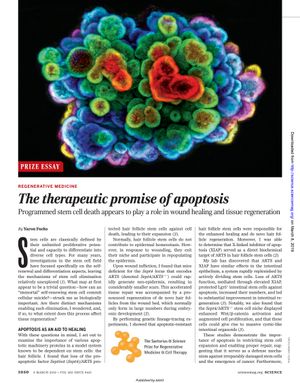The Therapeutic Promise of Apoptosis
March 2019
in “
Science
”
apoptosis hair follicle stem cells pro-apoptotic factor Sept4 ARTS neo-epidermis formation scarring regeneration hair follicles embryonic development apoptosis-resistant intestinal epithelium Lgr5+ intestinal stem cells apoptosis-induced-apoptosis caspase-3 YAP activity hair stem cells skin regeneration wound healing hair growth stem cell therapy

TLDR Blocking cell death in certain stem cells can improve wound healing and tissue regeneration.
Yaron Fuchs' research demonstrated that inhibiting apoptosis in hair follicle stem cells, through the loss of the pro-apoptotic factor Sept4/ARTS, leads to their expansion and enhances wound healing and tissue regeneration. Mice lacking Sept4/ARTS showed rapid neo-epidermis formation, reduced scarring, and the regeneration of new hair follicles, a process normally limited to embryonic development. Genetic lineage-tracing experiments confirmed that these improved healing outcomes were due to apoptosis-resistant hair follicle stem cells. Similar regenerative effects were observed in the intestinal epithelium, where ARTS deficiency increased Lgr5+ intestinal stem cells. The study also uncovered the "apoptosis-induced-apoptosis" mechanism, where dying cells promote apoptosis in neighboring cells to advance the hair cycle, and identified non-apoptotic roles for caspase-3 in organ size regulation and tissue regeneration via YAP activity control. These findings suggest potential therapeutic applications in wound healing, regeneration, and tumor therapy by targeting apoptotic pathways.






